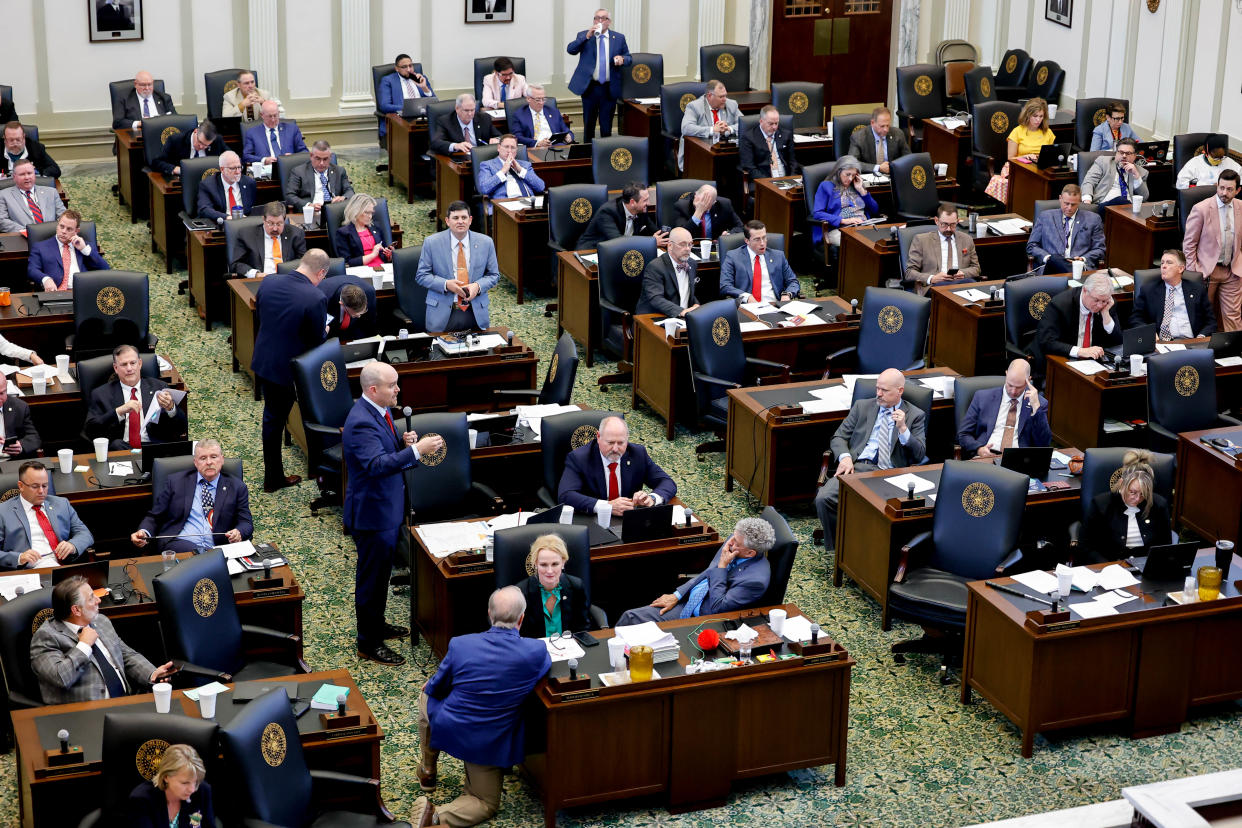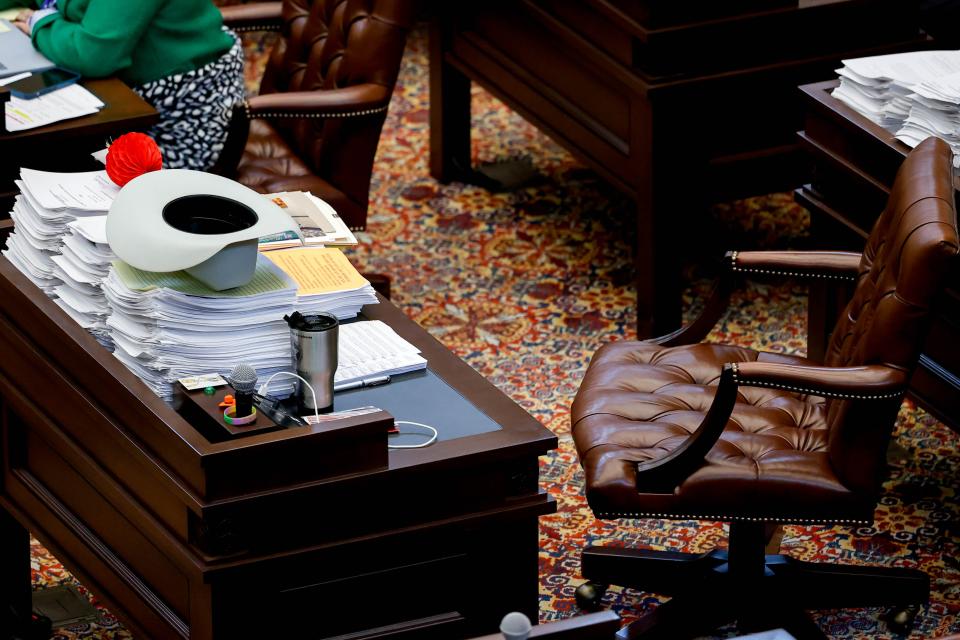Lawmakers end legislative session one day early; budget, tax cuts headline the debate

- Oops!Something went wrong.Please try again later.
The second session of the 59th Oklahoma Legislature adjourned sine die late Thursday afternoon, one day before it was required to do so by the Oklahoma Constitution.
And though normally the sine die of legislative session — sine die is Latin for "without a date fixed" — is the chance for both lawmakers and state officials to catch their breath, thank their staffs and put the final touches on spending and policy issues for the next year, this year's session was filled with an extraordinary amount of Republican infighting and power struggles between the governor's office and the Legislature.
In addition, the session became the capstone to a yearlong debate over income tax cuts and only a handful of significant policy issues — all framed against an upcoming presidential election this fall.
"It's been a helluva ride," said one legislative staff member, who asked not to be identified. "And it got worse as the session went on."

What happened in the final hours of the legislative session
Thursday afternoon, both the House and Senate passed several last-minute budget bills and a handful of policy related issues. The Oklahoma Senate adjourned the session for the year at 5:19 p.m. Senate Minority Leader Kay Floyd made the motion to adjourn, which was answered with shouts of 'yes!'
The House of Representatives roughly an hour later. Under the Oklahoma Constitution, the Legislature is required to adjourn by 5 p.m. on Friday, May 31.
Senate Pro Tempore Greg Treat said he thought the session was very successful. Treat pointed to Legislature's adoption of conservative policies and the passage of a $12.5 billion state budget.
"I'm very pleased with how things turned out," he said.

Treat, who is completing his tenure as the Senate's leader and as a member of the Oklahoma Senate, said his caucus set goals at the beginning of session and delivered on those goals.
"We've hit all those markers of success, delivered the largest tax cut in state history through the grocery tax and provided a transparent budget process, kept $1 billion in cash free and clear from all other savings accounts and passed the Mason Treat Act," he said. "It's been a very successful and rewarding session — though a taxing one — but very successful. I'm very pleased."
More: House, Senate GOP leaders reach agreement on budget — with no income tax cut
Though Treat was quick to acknowledge the general public may not embrace the political fights between chambers and the public rancor involved in the process, he praised the Senate's record of bipartisan effort in "getting things done" and passing substantial legislation.
"You see the fighting," he said. "But the differences between here and in D.C. is we actually like each other and we're getting things done."
House Speaker Charles McCall said lawmakers sent more than 430 bills to the governor this session, including bills to address illegal immigration, codify the Women's Bill of Rights and prohibit ranked-choice voting within the state.
"I have always said that the House is the body closest to the people, and we showed that once again this session by passing multiple pieces of legislation that were priorities of our constituents," McCall said. "Throughout my time in the Legislature I have taken service to my district, and the citizens all across our state, very seriously, and it has been an honor to serve as Speaker of the House for the past eight years. President Theodore Roosevelt said, ‘Nothing worth having comes easy.’ I have seen that to be true through both highs and lows during my time in the House, but I am proud to say that without a doubt our state is in a better place now than it was when I was first elected. That is only possible through the effort of my Caucus, and I am thankful for their support over the last decade as we have made Oklahoma a better place to live, work and raise a family."
McCall who is term-limited, said the House also launched an online budget dashboard that details appropriations for the previous fiscal year, state agencies' budget requests and each chamber's official negotiating position.
The House Budget Transparency Portal has given Oklahomans an unprecedented amount of access to the budget process,” McCall said. "Through the hard work of House staff, Oklahomans have been able to see every step of the budget process play out, and can see exactly where their hard earned tax dollars are being spent. Although the House would have preferred to see an income tax cut included, the budget passed by the Legislature is a good budget that funds core services and decreases government spending from last year. I’m proud of the House negotiating team for their hard work throughout the process, and confident that Oklahomans will be pleased with the result.”
Senate Education Committee Chairman, Sen. Adam Pugh said he, too, was pleased lawmakers finished their work done − effectively 'landing the plane.'
"It was a little bumpy and maybe some passengers got hurt because of a little bit of turbulence at times," he said. "But I'll say this, every morning when I walk in I remind myself that tension is a feature of our system. It's meant to be hard to get stuff done."
Pugh said he was glad that lawmakers made another investment in education. He pointed to the graduation pathways legislation and major revisions to the reading sufficiency act as examples of legislation passed this year that would improve the state.
Democrats, however, called the session a missed opportunity.
"The budget is, of course, our Number One priority. It's the one thing we're constitutionally required to do when we're in session," Senate Minority Leader Kay Floyd said. "And this year it has been different and we believe, unfortunately, it was a missed opportunity even with the new system."

Floyd praised the Senate leadership's efforts to make the budget process more transparent, but said the Senate missed an opportunity to protect the initiative petition process. "We had the opportunity to protect the voice of the people, and we missed that opportunity when the bill was run," she said.
Floyd was speaking about House Bill 1105, which extends the protest period on initiative petitions from the current 10-day time frame to 90 days.
Democratic leaders say they were left out of budget conversations
Like her colleagues in the Senate, House Minority Leader Cindy Munson, D-Oklahoma City, said the FY 25 budget did not prioritize the needs of working Oklahoma families. Republicans, Munson said, put the governor's priorities first: putting $20 million in the Governor's Quick Action Closing Fund that has little oversight or accountability, tribal litigation fund to continue fighting with tribes, attacking our judiciary by keeping judicial salaries below the regional average, and creating an unnecessary business courts task force.
"This budget missed opportunities to make significant investments in child care, mental and behavioral health care, and public education," Munson said. "With record savings, we could have put more money back into the pockets of everyday, working Oklahomans by modernizing the Sales Tax Relief Credit, but instead, put more public tax dollars into private schools and private businesses."
More: Lawmakers give Oklahoma oil and gas industry $50 million in budget agreement

Munson also criticized the way the budget was developed, saying Democratic leaders were left out of the conversation, which kept many priorities important to Oklahomans out of the budget.
"While the process has been more transparent than in the past, improvements to be more inclusive and balanced are necessary to truly address the challenges of our state," she said. "My hope is that with new leadership on the horizon, we will find ways to work together to ensure the needs of everyday Oklahomans are met through our state budget."
Echoing Floyd, former state Rep. Joe Dorman, the executive director of the Oklahoma Institute for Child Advocacy, said lawmakers had every opportunity to do the right thing, by passing House Bill 1028, which would have ended the use of corporal punishment on children with certain disabilities.
“We gave the Legislature, specifically the Oklahoma House of Representatives, every opportunity to do the right thing,” Dorman said during a press conference on the fifth floor of the Capitol building Thursday afternoon. “By even the most conservative count, there are enough bipartisan votes in the House to have passed the bill. Sadly, the leadership team of the House refused to bring the bill up, killing it in the proverbial "smoke-filled room.”
The version of HB 1028 representatives would have considered had already passed the Oklahoma Senate by a healthy margin. All that was left was two separate votes, one to accept the Senate amendments to the bill and then a vote on final passage, to send the bill to Gov. Stitt’s desk. Failure of the House leadership to allow the votes has again made Oklahoma “a national embarrassment,” Dorman said.
This article originally appeared on Oklahoman: Oklahoma legislative session 2024 session ends one day early

